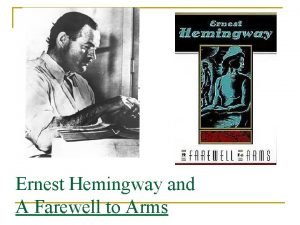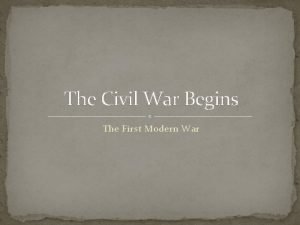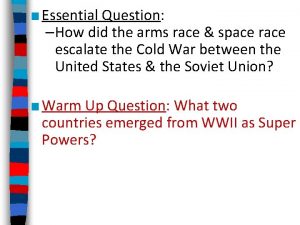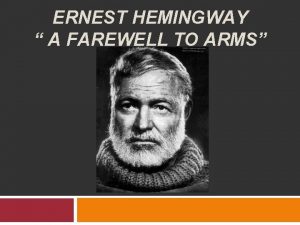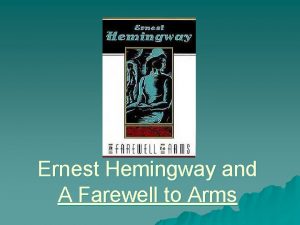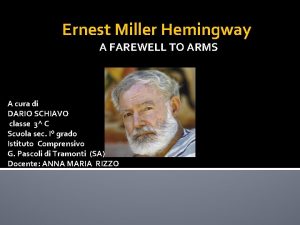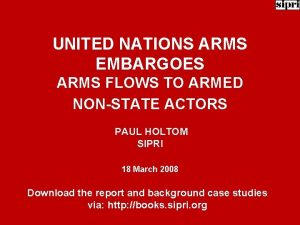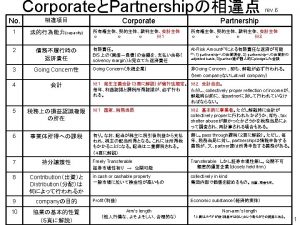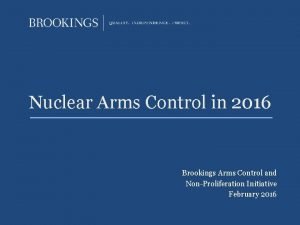Farewell to Arms War in Modern European History



















- Slides: 19

Farewell to Arms? War in Modern European History, 1815 -2015 Introductory Seminar

Today’s session The rules of the game Essay writing The history of war

The rules of the game Class etiquette Office hours: Tuesday 11 -12 pm & Thursday 11 -12 pm Room H 0. 10 Tel: 02476523316 (Mon, Tues, Wed, Thu) p. purseigle@warwick. ac. uk

Essay Writing Non-negotiables First steps Structure Evidence

The “non-negotiables” Formatting Referencing – Precision and consistency Spelling Grammar and syntax

First steps Read analyse the essay title. Be as careful and thorough as possible, and answer a set of basic questions: What is the subject matter? What period shall I consider? Which geographic area? Etc… The punctuation, the use of singular/plural, may also be important. Then, write down your preliminary thoughts and ideas and try to identify the historical problem raised by the question.

How to organize your argument and structure your essay Introduction – First: introduce and present the subject matter in broad terms – Secondly: identify and clarify the historical problem – Thirdly: signpost your argument

Take the reader for a walk… As you are taking your reader on a walk, you first need to invite her/him, to let her/him know where you are both going to (introduce the subject matter). To capture her/his attention, her/his historical imagination, you need to make clear why the walk is worth her/his time and energy (raise the historical problem). Then show her/him the path you have decided to follow… (signpost your argument)

The body of the essay Make sure that your overall analysis and each of your individual points is buttressed by evidence. Make sure your essay follows a logical order; that the succession of points, sections, and paragraphs derives from an intellectual logic. In other words, your essay should not be a mere catalogue of ideas but should present them in a reasoned and coherent way.

How to use evidence Subject-matter: civil-military relations Point: no clear distribution of roles in wartime. Evidence: French Decree, 28 th October 1913: – Government = Conduite de la guerre – Military = Conduite des opérations militaires

How to use evidence Subject-matter: balance of forces Point: overwhelming technological & material allied superiority in 1918 Evidence: Germany Allies Guns 14. 000 18. 500 Planes 3. 760 4. 500 Tanks 10 800

The structure of the argument Not a list of bullet-points! • … • …

A coherent, structured argument HISTORICAL PROBLEM I. II. IV. SECTION A. Sub-section 1. Point supported by evidence 2. … B. Sub-section A. … B. … SECTION A. Sub-section B. Sub-section

War and the Historian Objections to war – Political – Ethical The problem with military history – Political – Ethical – Intellectual

War: History and Historiography War and classical historiography – Herodotus (c. 485 -430 BC) – Thucydides (c. 460 -396 BC) – Xenophon (c. 426 -355 BC) War makes History Military revolution 16 th-18 th: practitioners and historians – – Technologies, armies and the State Maurice de Saxe, Henry Lloyd, G. F. von Tempelhoff The Art of War The Enlightenment and the road to “Total war” – – Revolutionary and Napoleonic wars A. H. Jomini, Précis de l’art de la guerre; C. von Clausewitz, Vom Kriege (1832) The Science of War

War and the Academy: Neglect, rejection, reluctant embrace? War and philosophy: paradoxical legacy of the Enlightenment Military academies – 1802: Saint-Cyr, West Point, Sandhurst – 1810: Preußische Kriegsakademie War and Universities – Hans Delbrück, Chair in Universal and World History, 1895 – Oxford Chichele Professor of the History of War, 1909 – King’s College, London, Chair in War Studies, 1964 Michael Howard KCL Chair in War Studies, 1964 Oxford Chichele Professor, 1970 Yale Lovett Professor of Military and Naval History, 1993

War and Academic History New paradigms – Decline of political and diplomatic history – Rise and fall of social and economic history – Emergence of cultural history Political suspicion – Nationalism and conservatism – New voices – The historian as a citizen New approaches – War and society – “New” military history – The challenge of social sciences

Uses and abuses of military history Authors, Audiences, Agenda Didactic Political and commercial “Comprehensive” (Max Weber) Armed forces Public opinion Scholarship

War as an intellectual problem Categories of analysis - From military history to the history of war - Levels of experience and scales of analysis Historical problems – Combat – Mobilization – Legacies War studies and disciplinary identities – Violence – Anthropology & Ethics – Power – Politics & International Relations – Wealth – Economics An object of interdisciplinary study par excellence Intellectual necessity and contemporary relevance
 A farewell to arms themes
A farewell to arms themes Iceberg theory in a farewell to arms
Iceberg theory in a farewell to arms Hills like white elephants protagonist
Hills like white elephants protagonist Varvara mikheeva
Varvara mikheeva Why was the civil war the first modern war
Why was the civil war the first modern war Why did the arms race escalate during the cold war
Why did the arms race escalate during the cold war Realism in modern european drama
Realism in modern european drama European center for modern languages
European center for modern languages European center for modern languages
European center for modern languages European war 1
European war 1 Middle ages floral design
Middle ages floral design European union history
European union history Baroque period flowers
Baroque period flowers What is art of emerging europe
What is art of emerging europe Dbq scoring rubric
Dbq scoring rubric Colonial williamsburg floral design time period
Colonial williamsburg floral design time period Ap european history chapter 17
Ap european history chapter 17 European music history
European music history Is poland considered eastern europe
Is poland considered eastern europe Early american period floral design
Early american period floral design

